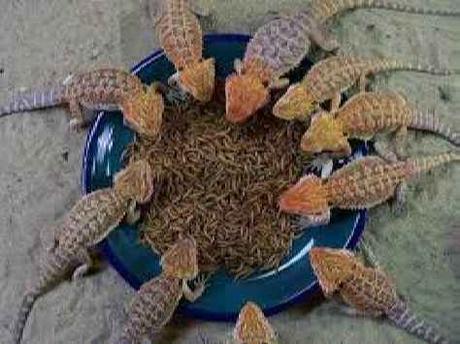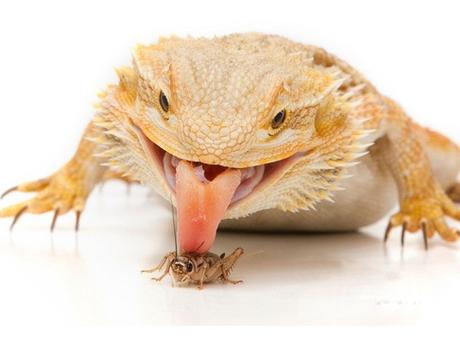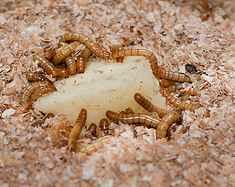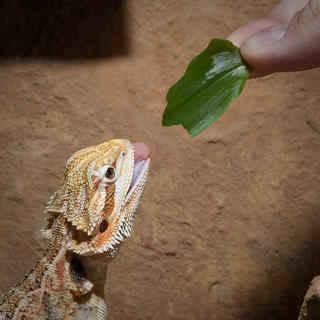
As with any animal, proper nutrition is essential for the growth and development of bearded dragons. In particular, feeding baby dragons a well-balanced diet is crucial for ensuring that they reach their full potential.
Baby bearded dragons require a diet that is high in protein and calcium, as these nutrients are essential for their bone and muscle development. By providing your baby dragon with a nutritious diet, you can help them grow into healthy and happy adult lizards.
What to Feed a Baby Bearded Dragon
When it comes to feeding your baby bearded dragon, there are a few options to consider. Some owners choose to feed their dragons live insects, while others prefer to offer pre-packaged diets or a combination of both. It's important to note that live insects should be gut-loaded, meaning they are fed a nutritious diet before being offered to your dragon.
Common live insects fed to bearded dragons include crickets, mealworms, and dubia roaches. It's also important to offer a variety of greens and vegetables, such as collard greens, dandelion greens, and squash.
Live insects are a popular choice for feeding baby bearded dragons because they are high in protein and mimic the dragon's natural diet in the wild.
However, it's important to choose the right type of insect and prepare it properly.
Crickets are a common choice and can be found at most pet stores, but they should be gut-loaded with nutritious food before being offered to your dragon.
Mealworms are another option, but they are high in fat and should only be offered in moderation. Dubia roaches are a great choice because they are low in fat and high in protein, but they can be more expensive than other feeder insects.
However, their nutritional value and ease of digestion make them worth the investment for your pet's health.
Types of Insects
There are a variety of insects that can be fed to baby bearded dragons, each with their own nutritional benefits.
For example, black soldier fly larvae are high in calcium and low in fat, making them a great option for promoting healthy bone growth.
Silkworms are also a good choice, as they are high in protein and contain essential amino acids.
Waxworms, on the other hand, should only be offered as an occasional treat due to their high fat content.
When selecting insects, it's important to consider their nutritional value and balance them with a variety of other foods to ensure your dragon's diet is well-rounded and meets all their nutritional needs.
Some good options include crickets, dubia roaches, and black soldier fly larvae.
Preparing Insects

Before feeding insects to your baby bearded dragon, it's important to properly prepare them to ensure they are safe and nutritious.
First, you should purchase insects from a reputable source to avoid any potential contamination or exposure to pesticides.
Next, you can gut-load the insects by feeding them nutrient-rich foods such as dark leafy greens or fruits. This will increase their nutritional value for your dragon.

Finally, you can dust the insects with calcium and vitamin supplements to ensure your dragon is getting all the necessary nutrients.
By properly preparing their insect diet, you can help promote healthy growth and development in your baby bearded dragon.
How to Feed Baby Bearded Dragons Insects
Once you have properly prepared the insects, it's important to know how to feed them to your baby bearded dragon.
The size of the insects should be appropriate for the size of your dragon's mouth to avoid choking hazards.
You can offer the insects to your dragon using tongs or by placing them in a feeding dish. It's important to monitor your dragon during feeding to ensure they are not overeating or struggling to eat the insects.
Additionally, any uneaten insects should be removed from the enclosure to avoid attracting pests or causing health issues for your dragon.
With proper feeding techniques, your baby beard dragon will grow into a healthy and happy adult, providing you with years of enjoyment as a unique and fascinating pet.
Vegetables
In addition to feeding insects, it's important to incorporate vegetables into your baby bearded dragon's diet.
Types of Vegetables

Some great options for vegetables include collard greens, mustard greens, dandelion greens, and butternut squash. These vegetables are high in calcium, which is important for your dragon's bone health, as well as other essential vitamins and minerals.
Preparing Vegetables
Before feeding vegetables to your baby bearded dragon, it's important to properly prepare them. Make sure to thoroughly wash the vegetables to remove any dirt or pesticides.
You can then chop them into small, bite-sized pieces that are easy for your dragon to eat.
It's also important to avoid feeding your dragon any vegetables that are high in oxalates, such as spinach or kale, as they can interfere with calcium absorption.
By incorporating a variety of vegetables into your dragon's diet, you can help ensure that they are getting all of the nutrients they need to thrive.
Feeding Vegetables
When introducing vegetables to your baby bearded dragon, start by offering small amounts and gradually increase the amount over time.
You can offer vegetables in a separate dish or mix them in with their regular protein source. It's important to remove any uneaten vegetables after a few hours to prevent spoilage and bacterial growth.
How Often to Feed Vegetable to a Baby Bearded Dragon
Bearded dragons should be offered vegetables daily, with a variety of options, to ensure they are getting all the necessary nutrients.
As a general rule, vegetables should make up about 20-30% of their diet, with the rest being made up of protein sources such as insects or commercial diets.
It's important to monitor your dragon's weight and adjust their diet accordingly, as overweight dragons may need to have their vegetable intake reduced.
With a balanced and varied diet, your bearded dragon will be happy and healthy for years to come.
In conclusion, feeding your bearded dragon a balanced and varied diet is crucial for their health and well-being. This includes offering a variety of vegetables daily, while also monitoring their weight and adjusting their diet accordingly.
By following these guidelines, you can ensure that your bearded dragon will live a happy and healthy life for many years to come.
